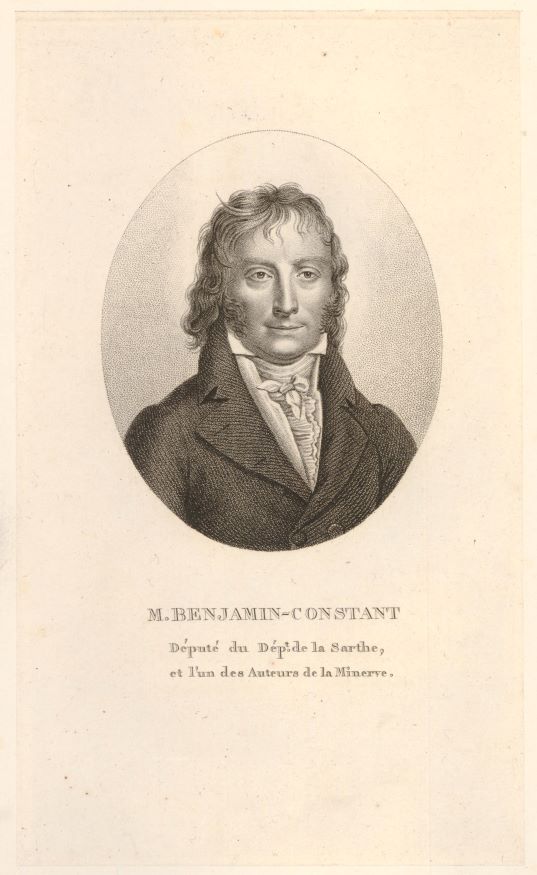Liberty Matters
On Constant and Lamennais

I would like to take up Constant's argument with one of the figures that Aurelian Craiutu has so usefully brought into the conversation, Félicité Robert de Lamennais. Professor Craiutu reminds us that Constant framed his defense of a sentimental, individualistic understanding of religion partly as a response to Lamennais's arguments in Essai sur l'indifférence en matière de religion. Lamennais's views were complicated and changed significantly during the course of his life, but when he wrote the Essai he offered an influential attack on the notion of private judgment that Constant, along with Germain de Staël, championed. Lamennais thought that the destructive aspects of the Revolution had demonstrated the anarchic implications of allowing individuals to judge for themselves about moral and political matters. He opposed the Reformation in religion and Cartesian thinking in philosophy. He argued, instead, for deference to "authority." Constant regarded that as a recipe for priestly oppression.
Constant focused on Lamennais directly and by name in a very long footnote to chapter three of book one of On Religion, pages 48-53 in the Liberty Fund edition. The second and more interesting part of the note points us to some of Constant's most deeply held convictions, and to the basic structure of his thought about both religion and politics.
Constant zeroed in on Lamennais's argument that "one must discover a reason that cannot err, an infallible reason," which Lamennais located in the "reason of all" or the "general reason" as expressed by authority. Constant rejected the view entirely, declaring it impossible to find an infallible reason in this world:
To be sure, it [an infallible reason] can exist in the infinite being. It, however, does not exist in, or for, man. Endowed with a limited intelligence, he applies this intelligence to each object he is called upon to judge, on each occasion he is forced to act…This intelligence is progressive, and precisely because it is progressive it is not immutable; there is nothing infallible in what it discovers… (On Religion, 51-52).
What follows is an analogy crucial to understanding how Constant's religious thought was linked to his more famous thinking about politics: "It is the same with the infallible reason of the human race as it is for the unlimited sovereignty of the people" (p. 52). Constant's opposition to Rousseauian unlimited popular sovereignty was, for him, analogous to his opposition to the rule of priests.
Constant's liberalism – his principled attachment to individual rights and to systems of government that resisted consolidated control even by representatives of the people – was based in some way on the view that human intelligence was progressive. This meant that no opinion expressed today was finally authoritative, since that would leave no room for further improvement. The implication in religion was that no class of priests could claim final authority over divine matters, and the implication in politics was that no class of rulers, including "the people" as they exist at one point in time, could claim final authority over civic matters. Liberalism protected the freedom for individuals to exercise judgment and therefore to contribute to the processes that produce progress in morals and religion.
I would go one step further and suggest that the elusiveness of the precise content of the religious sentiment in Constant's writing (which I remarked upon in my first post) did not arise from a failure to write or think clearly. The sentiment of the divine or sublime that Constant usually described only in metaphorical terms was an abstraction meant to resist usurpation by authority, a feeling separate from all doctrinal and ceremonial constraints and therefore not easily corrupted into a means of domination. Constant wanted the moral and psychological force of religion to be wielded against authority rather than on its behalf; he wanted it to sustain the political culture of criticism that was so central to his liberalism. In this way his approach to religion and politics was fundamentally different from many thinkers who concerned themselves with civil religion, including, I think, Tocqueville.
Copyright and Fair Use Statement
“Liberty Matters” is the copyright of Liberty Fund, Inc. This material is put on line to further the educational goals of Liberty Fund, Inc. These essays and responses may be quoted and otherwise used under “fair use” provisions for educational and academic purposes. To reprint these essays in course booklets requires the prior permission of Liberty Fund, Inc. Please contact oll@libertyfund.org if you have any questions.